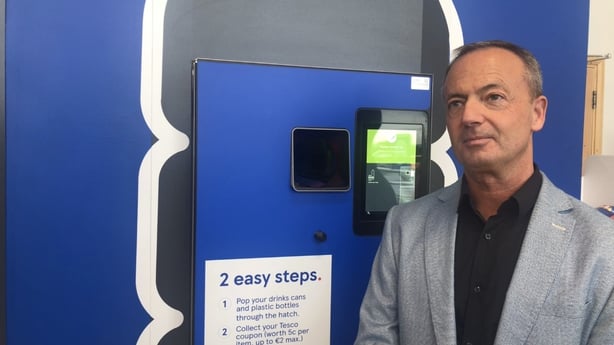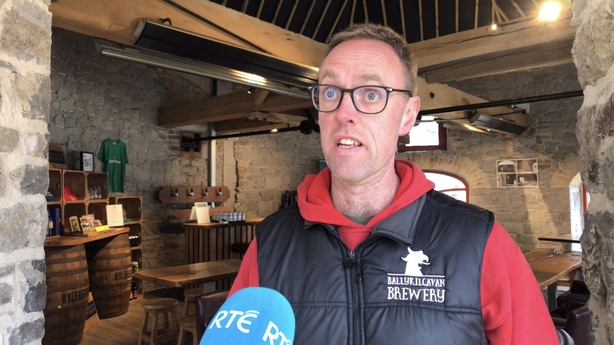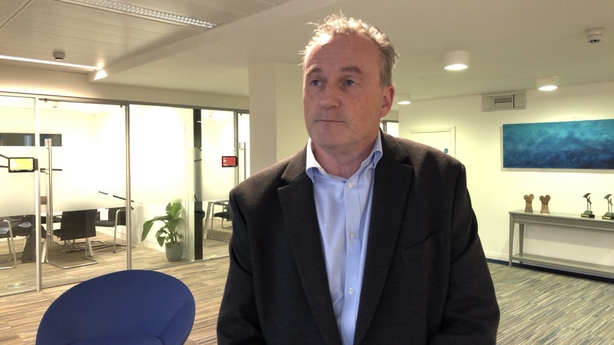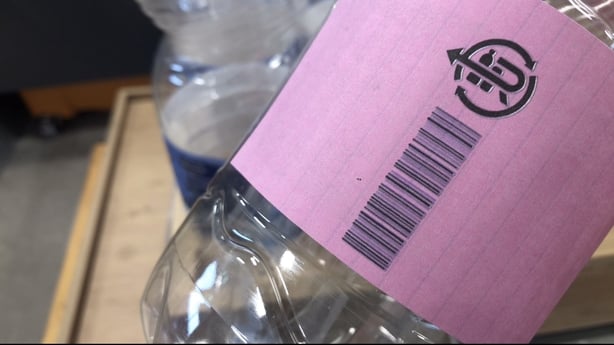Just inside the door of Tesco’s Extra outlet in Drogheda - fittingly tucked away behind a fridge full of drinks - is a facility that Irish consumers will shortly become very familiar with.
That’s because it represents the final step - for regular customers at least - of the new Deposit Return Scheme which comes into effect here on February 1.
That will see a 15 cent levy added to every aluminium can or plastic bottle sold in Ireland (25 cent for bottles over 500ml). And customers will have to return their empties to the likes of these 'reverse vending machines’ in order to get that back.

"It’s quite a bigger plan than we had anticipated," said Darrin Honer, country operations manager at Tesco Ireland. "Every single store in the country has to be retrofitted, to fit in the machine."
Any retailer that sells canned or bottle drinks has to register with the new scheme, and charge the deposit on each item sold.
Shops over a certain size then have to accept empties back, and return the deposits paid.
They can choose to do this manually, but most retailers - including Tesco - have opted to install automated machines instead.
"This investment for this particular store is over €200,000," he said. "To multiply that out, it’s quite a huge investment."
The country’s drinks producers also need to sign up to the scheme - and track every single can or plastic bottle they ship.
That’s resulting in a significant amount of new administration - especially for smaller producers.

"We have to split into invoices, we have to put the deposits on the invoices separately from the cans, we have to make a return to the scheme operators in terms of how many cans have gone out," said David Walsh-Kemmis, founder and managing director at Ballykilcavan Brewing Company in Co Laois.
"I have to say we’re in favour of the scheme - we want to see as much aluminium being recycled as possible - but for a small brewery for us it really does create a significant administrative and cashflow problem."
The most immediate challenge they face, though, is the upcoming transition period.
"We have to have all our cans without a deposit sold by the middle of March, and we can’t start selling the new cans with the deposit until the first of February," he said.
"So it’s a lot of stock management to ensure we’re not going to be left with stock that we’re not going to be able to sell."
We need your consent to load this rte-player contentWe use rte-player to manage extra content that can set cookies on your device and collect data about your activity. Please review their details and accept them to load the content.Manage Preferences
The transition period is expected to be rough for consumers, too.
From February on, people will have to maintain yet another bin at home in order to keep cans and bottles out of their general waste or regular recycling.
And if they want their money back, they’ll also have to resist the urge to crush their cans - otherwise those automatic machines won’t be able to accept.

"We appreciate there’s a hassle there," said Ciaran Foley, the newly appointed CEO of Re-Turn, which is administering the scheme in Ireland.
"We’re asking people to keep their cans and bottles separate and bring them back to the shop or supermarket.
"We recognise this is probably the biggest social, behavioural change since the plastic bag levy or the smoking ban - we’re not under-estimating that at all."
However he is confident consumers will get on board with it once they fully understand what’s involved, and the reasoning behind it.
Ireland’s move to a deposit return scheme is aided by the fact that many other countries - particularly in mainland Europe - have had similar systems up and running for some time.
That means it can learn from others’ mistakes - while also see hard evidence that such a scheme helps to boost recycling rates.

That is critical for Ireland, as this scheme is designed to help the country hit EU targets for the recycling of plastic. "When you think there’s probably up to 2 billion containers of aluminium cans and plastic bottles that are going on the market in Ireland each year, you can see the scale of the impact of moving," he said.
"It’s the impact on litter across the country, and cleaning up Ireland it’s obviously emissions-saving, great for the climate, and it’s the only way we can reach those recycling targets."
And despite the costs involved in facilitating returns, retailers are also fully supportive of the scheme.
They even believe getting their reverse vending machines right will help to draw more shoppers to their tills, as people will go out of their way to go to shops with the most reliable customer experience.
But there are also unknowns to how consumers will react to the new scheme.
Multi-packs of drinks, for example, will be particularly hard hit – as each bottle or can will have a levy applied.
"I think initially there’ll be a lot of learning for customers… it will add what I call ‘temporary inflation," said Tesco‘s Darrin Honer.
"We believe it will change the market-place and customers will dictate that, not us."







